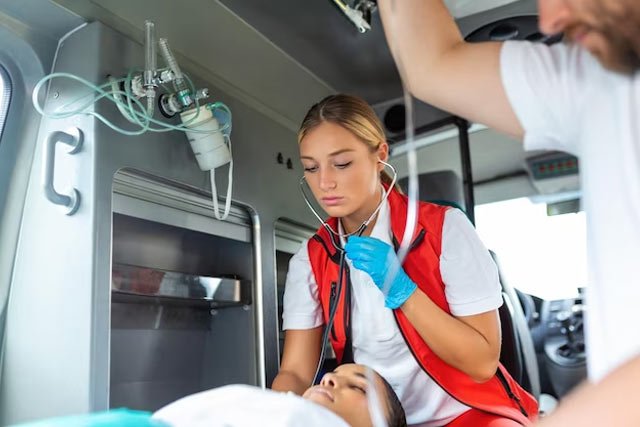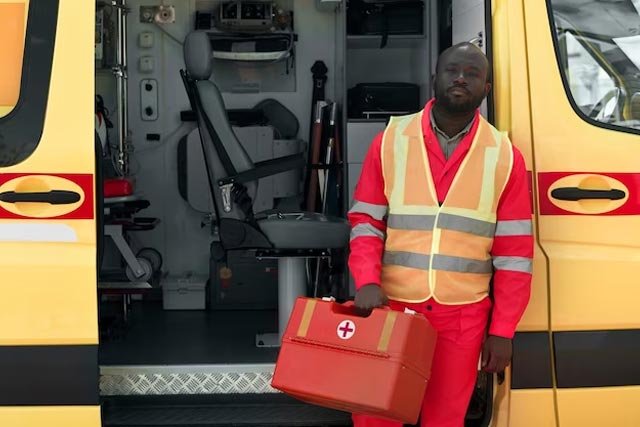Medical transportation companies, also known as nemt businesses, specialize in providing efficient and reliable transportation services for patients. These nemt business work closely with insurance companies to ensure that their clients receive the necessary coverage for their transportation needs. Their services encompass a range of options, such as curb-to-curb and stretcher transportation, catering to diverse patient requirements.
Medicaid beneficiaries who face extraordinary barriers to their healthcare appointments often use non-emergency medical transportation services. These barriers include a lack of a driver’s license or working vehicle, geographic isolation, and other limitations.
Ambulatory

Ambulatory medical transportation refers to vehicles designed specifically for emergency care and transporting patients from an accident or disaster scene to a hospital. Ambulances typically equip themselves with basic life support (BLS) equipment and include a crew of EMT professionals. People sometimes refer to these vehicles as mobile intensive care units or mobile ICUs.
Ambulances are most commonly used in emergencies and can be dispatched by calling 911 or similar emergency services. They often arrive very quickly, and their goal is to get the injured person into a hospital as soon as possible. When the ambulance travels to its destination, it will perform various tests or treatments on the patient to help keep them stable until they reach the hospital.
Some ambulances may serve as hearses when the situation requires it and may have special systems equipped to help preserve the organs of a recently deceased person. Countries with limited or no facilities available to preserve and recover organs for transplant often use them.
An air ambulance, a fixed-wing aircraft, can transport a patient. These are typically used when the distance to be traveled is too great for a helicopter or when a patient needs more advanced medical equipment that can be carried in a standard ambulance.
The definition of an ambulance varies depending on the jurisdiction. For instance, some EMS agencies staff non-transporting ambulances with fewer personnel who have a lower level of training compared to the crew of an emergency ambulance. If necessary, they can modify certain vehicles that are not ambulances, like police cars, to accommodate medical equipment and passengers.
In addition to the ambulance and other emergency medical vehicles, many companies offer non-emergency medical transportation (NEMT) for patients who require a ride to and from medical appointments. These can include patients who need a ride due to being wheelchair-bound or bedridden and those with other specific needs. NEMT is often cheaper than an ambulance ride and can be scheduled in advance.
Some NEMT business providers also offer long-distance NEMT, which involves travel between hospitals in different cities or countries. This can be useful for patients who need to go from one hospital to another because they have a specialist doctor or the nearest hospital has better equipment. Typically, people not in an emergency, such as needing a physical therapy session or dialysis appointment, reserve this type of NEMT. It is important to note that long-distance NEMT is only available through certain companies and may be more expensive than other options.
Stretcher

Medical transportation services provide patients with transport to and from pre-scheduled healthcare appointments. These appointments can include doctor visits, rehabilitation treatments, clinical testing, and follow-up examinations. Several medical transportation companies exist, including wheelchair transport and stretcher services. Some also offer flight escort services for patients who require close medical supervision in transit. Additionally, organizations may employ courier services to transport biological material such as blood or organs.
A basic medical transport service provides a vehicle and one or more paramedics to assist the patient in transit. This type of service is usually a less expensive option than an ambulance. However, it may not meet the specialized needs of some patients. This is especially true for patients with complex care needs who may need to be transferred from a wheelchair to an operating table. During this time, the transport team would monitor vital signs and administer medications. Similarly, some medical transportation companies offer advanced life support services for patients with serious conditions who need constant monitoring and oxygen administration.
Other companies that specialize in medical transportation offer on-demand or on-call services for individuals who cannot afford to pay for their private transportation. These companies typically use ride-sharing vehicles and have healthcare case managers or other qualified individuals request the ride on behalf of a patient while they monitor the trip. Medicaid and Medicare generally cover these services.
Another specialized medical transport service is the stretcher business, which provides transport for people with spinal or back injuries. These trucks have a specially equipped flat surface that can be lifted to load a patient. They can then lower the stretcher to the floor or place a cot on it to accommodate the patient. It takes two strong individuals to carry a patient on a stretcher.
A non-emergency medical transportation (NEMT) company is a service that provides safe and convenient transportation for patients with special needs to their pre-scheduled healthcare appointments. NEMT is particularly important for elderly or medically frail patients in rural areas who do not have access to transportation. A recent study found that over 3.6 million Americans elect to dismiss or delay medical treatment due to transportation issues. This can strain our main healthcare systems, so it is critical to offer a cost-effective alternative.
Non-Emergency

The non-emergency medical transportation (NEMT) industry services patients who need assistance getting to and from medical appointments. The services are typically provided through Medicaid programs or private insurance policies. However, patients are typically required to pay a copayment for the service. The NEMT service allows patients to make appointments without incurring high ambulance transport costs. Approximately four million Americans miss their doctor’s appointments because of transportation problems. Providing consistent transportation access improves healthcare outcomes and results in significant cost savings.
A business plan is a document describing a company’s goals and strategies. It is useful in helping the business obtain funding and plan for growth. It should summarize the company’s products and services, market analysis, and financial projections. This document is critical for any company launching a new product or service. It also helps investors understand the potential return on investment and risk associated with a particular venture.
Before starting a NEMT business, it is important to understand the local market for your product. This will help you determine how much capital to raise and how fast to grow your business. Performing market research can help you identify the size of your target market and its demographic characteristics.
Once you understand your local market, you can build a business model for your NEMT company. This section should describe your product and the customer segment(s) you will serve. It should also detail how you will compete with your competitors. This includes describing your value proposition and discussing any unique features that you will offer.
Another important element of your business plan is your management team. A strong management team can help your NEMT business grow and thrive. Your team should have extensive experience in the healthcare industry and be able to demonstrate their ability to run a successful business. Your team members should be able to handle a wide range of business functions, including scheduling, billing, and patient relations.
Depending on your company’s needs, consider offering door-through-door service. This service is ideal for elderly patients or those who need assistance walking. If your company plans to offer this service, specifying this in the initial discussion with the client is crucial. Curb-to-curb service is also available for a fee. This is a less hands-on service, but it can still provide a comfortable ride to the appointment.
Medical couriers transport blood, organs, and other human biological materials between hospitals or research facilities. This type of service is essential in ensuring that these samples are transported safely and securely. Government agencies regulate the service and must meet strict standards.




